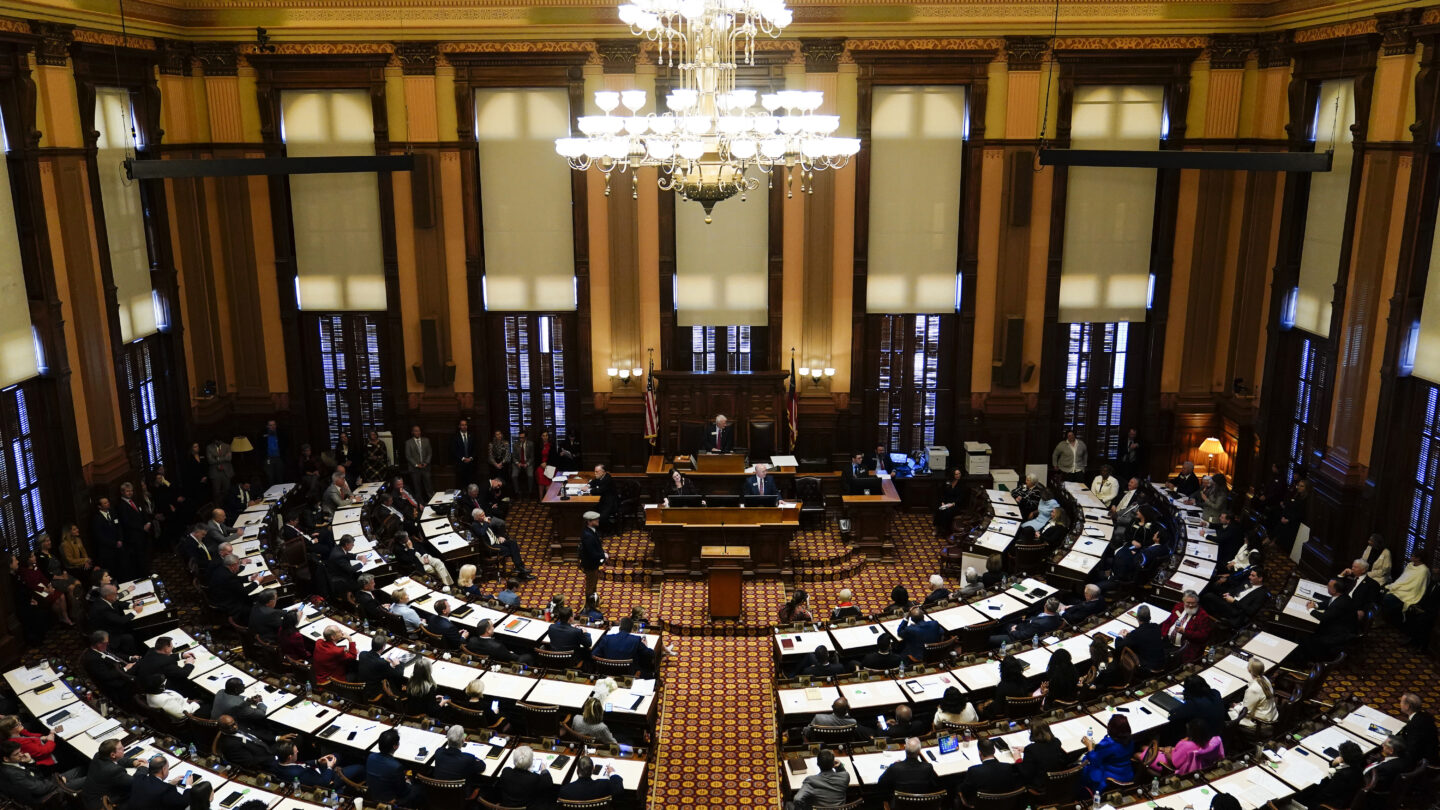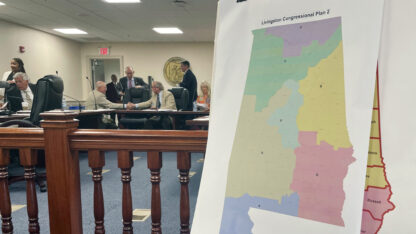Whether or not Georgia’s political maps are fair to Black voters is being questioned in a federal trial.
Three lawsuits are challenging Georgia’s state and congressional maps that were redrawn by Republicans in 2021. The state is accused of diluting the voting power of Black Georgians through racial gerrymandering, a violation of Section 2 of the Voting Rights Act (VRA).
The redistricting process happens every 10 years after a census. University of Georgia political science professor Charles Bullock says that legal challenges to political maps are nothing new.
“In Georgia, and this is happening around the nation, it has been for at least 30 years and one might argue 40 years … this has been the way the game is played,” Bullock says. “Do your best effort in the legislature, and when you lose, you go to court.”
The trial came off the heels of a Supreme Court decision ruling that Alabama’s congressional map violated the VRA.
Oral arguments in the Georgia case took place in September and a ruling is expected this fall.
Here’s what to know about the case.
The plaintiffs’ argument
The federal trial involves three lawsuits that make the same claim — Black voters in Georgia don’t have a fair shot at electing candidates of their choice on a Congressional or state level.
Over the last decade, nearly 500,000 Black people moved to Georgia, and Black residents now make up a third of Georgia’s population — and its electorate — according to the Pew Research Center. Since 2000, Georgia’s eligible voter population grew by 1.9 million, and nearly half of this increase was new Black voters. The plaintiffs argue that Georgia’s maps don’t reflect this growth, and the maps dilute Black voters’ political power.
They claim the state engaged in racial gerrymandering, which is generally known as the practice of drawing districts to advantage whites and disadvantage minorities. It’s done through “packing” and “cracking” districts.
Packing is the process of fitting as many voters as possible of one group into a district until there are excess votes that aren’t needed to decide an election.
In Georgia’s case, the plaintiffs say Black voters around the state were “packed” into districts. Nearby districts then became more white — and less likely to elect a candidate that Black voters support.
Cracking is manipulating district lines to put voters in districts where they have no chance to be influential in an election. In a general area heavily populated with Black residents, it could mean dividing Black residents into separate districts and including just enough white voters in each to dilute Black voters’ power in the general area.
The lawsuits propose the creation of new majority-Black districts in the state House and Senate by unpacking and uncracking districts near big cities and in the state’s “Black Belt,” which stretches roughly from Augusta to southwestern Georgia.
Black Georgians are overwhelmingly Democrats, but federal courts can’t rule on partisan gerrymandering. It’s typical for the party in power to redraw maps to their benefit. Republicans had control of the maps in 2021.
“You could make the case pretty easily that the only reason there is this narrow Republican majority in the U.S. House right now is because Republicans got to draw districts in Georgia and Texas and Florida and Alabama,” Bullock said.
The plaintiffs want the state to redraw political maps to create more majority-Black districts — ones that aren’t “packed” — to give Black voters a fair chance at electing representatives they vote for.
The state’s defense
The state is denying allegations that its maps dilute Black voters’ power and argues that race was not a primary factor in its decision-making during the redistricting process.
“The problem in the South is race and party are highly correlated with one another,” said Andra Gillespie, a political science professor at Emory University.
This is called racially polarized voting. In Georgia, it’s generally found that Black voters vote Democrat, and white voters vote Republican. Gillespie says this is because Democrats have a perceptual advantage over Republicans when it comes to civil rights, an issue important for Black voters.
But Gillespie says federal courts don’t recognize partisan gerrymandering as a problem. Legally, the state argued that party, not race, was a deciding factor in the new maps.
“What we will see ultimately, in the final rulings on this particular case, is how much the judges in this case actually believe that partisan gerrymandering was just a front or subterfuge for what at its core was racial gerrymandering,” she says.
Principles for redistricting
- Equalize populations between districts
- Don’t discriminate against minorities
- Continuity – the district must be connected entirely
- Compactness
- Consider existing political boundaries such as county lines
- Respect communities of interest
- Consider incumbents
Principles outlined by Charles Bullock
The state argued that Black-preferred candidates do have a fair shot at being elected, as shown by the victories of U.S. Rep. Lucy McBath and others. McBath, who is Black, beat former U.S. Rep. Carolyn Bourdeaux, who is white, in the 2022 election for the 7th district.
And given that Black voters make up one-third of Georgia’s electorate, there is proportionate representation in Congress. Five of Georgia’s 14 U.S. Representatives are Black.
The state says that the plaintiffs’ solution of drawing new maps with more majority-Black districts would focus too much on race and ignore the traditional principles of redistricting. One attorney said it has “all the hallmarks of a racial gerrymander,” as reported by the Georgia Recorder.
Georgia’s multiracial makeup could aid in the state’s defense. Different minority groups have different voting patterns, which could complicate the plaintiff’s argument that current maps disenfranchise Black voters specifically.
“What does under-representation look like?” Gillespie says. “And what does packing and cracking look like when we’re not talking about race and ethnicity on a binary?”
What’s next
U.S. District Judge Steve Jones said that he would make a ruling before Thanksgiving. If he rules that Georgia’s maps are unconstitutional, the state legislature will convene for a special session to redraw maps in time for the 2024 election.
In Pendergrass v. Raffensperger, the plaintiffs are seeking a new majority-Black congressional district in Atlanta’s suburbs on the west side.
In Alpha Phi Alpha Fraternity Inc. v. Raffensperger, the plaintiffs are seeking new maps that don’t dilute Black voters’ power in the state House and state Senate.
In Grant, et. al. v. Raffensperger, plaintiffs are seeking three more Black majority districts in the state Senate and five more in the state House.
There are two additional lawsuits challenging Georgia’s maps. The Georgia NAACP says Georgia’s congressional and state maps violate the VRA and the 14th and 15th Amendments. Another says the state violated the 14th Amendment in its congressional maps.









